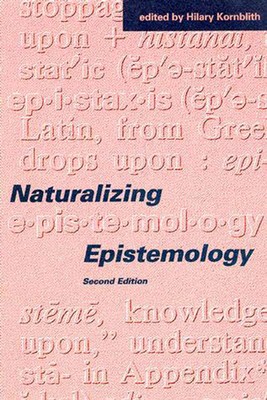
- We will send in 10–14 business days.
- Publisher: MIT Press
- ISBN-10: 0262610906
- ISBN-13: 9780262610902
- Format: 15.4 x 22.6 x 2.6 cm, softcover
- Language: English
- SAVE -10% with code: EXTRA
Naturalizing Epistemology, second edition (e-book) (used book) | bookbook.eu
Reviews
Description
The second edition of Naturalizing Epistemology has been updated and expanded to include seven new articles that take up ongoing debates in the field. As with the first edition, it explores the interaction between psychology and epistemology and addresses empirical questions about how we should arrive at our beliefs, and whether the processes by which we arrive at our beliefs are the ones by which we ought to arrive at our beliefs. The new material includes a critical examination of Quine's views on epistemology by Jaegwon Kim and an interesting psychological approach to our understanding of natural kinds by Ellen Markman. In other new chapters Jerry Fodor places the notion of observation in a naturalistic perspective, Christopher Cherniak shows how work in the theory of computational complexity bears on the form of an epistemological theory, and Alvin Goldman looks at the relationship between our ordinary epistemological concepts and those of a scientific epistemol-ogy. The prospects for improving our inductive inferences are examined by John Holland, Keith Holyoak, Richard Nisbett, and Paul Thagard, and Stephen Stich suggests a way in which normative concepts may be integrated into a naturalistic epistemology. The book retains articles by W. V. 0. Quine, Alvin I. Goldman, Hilary Kornblith, Philip Kircher, Michael Friedman, Fred Dretske, Richard Nisbett and Lee Ross, Gilbert Harman, and Stephen P. Stich.
EXTRA 10 % discount with code: EXTRA
The promotion ends in 16d.17:36:53
The discount code is valid when purchasing from 10 €. Discounts do not stack.
- Publisher: MIT Press
- ISBN-10: 0262610906
- ISBN-13: 9780262610902
- Format: 15.4 x 22.6 x 2.6 cm, softcover
- Language: English English
The second edition of Naturalizing Epistemology has been updated and expanded to include seven new articles that take up ongoing debates in the field. As with the first edition, it explores the interaction between psychology and epistemology and addresses empirical questions about how we should arrive at our beliefs, and whether the processes by which we arrive at our beliefs are the ones by which we ought to arrive at our beliefs. The new material includes a critical examination of Quine's views on epistemology by Jaegwon Kim and an interesting psychological approach to our understanding of natural kinds by Ellen Markman. In other new chapters Jerry Fodor places the notion of observation in a naturalistic perspective, Christopher Cherniak shows how work in the theory of computational complexity bears on the form of an epistemological theory, and Alvin Goldman looks at the relationship between our ordinary epistemological concepts and those of a scientific epistemol-ogy. The prospects for improving our inductive inferences are examined by John Holland, Keith Holyoak, Richard Nisbett, and Paul Thagard, and Stephen Stich suggests a way in which normative concepts may be integrated into a naturalistic epistemology. The book retains articles by W. V. 0. Quine, Alvin I. Goldman, Hilary Kornblith, Philip Kircher, Michael Friedman, Fred Dretske, Richard Nisbett and Lee Ross, Gilbert Harman, and Stephen P. Stich.


Reviews